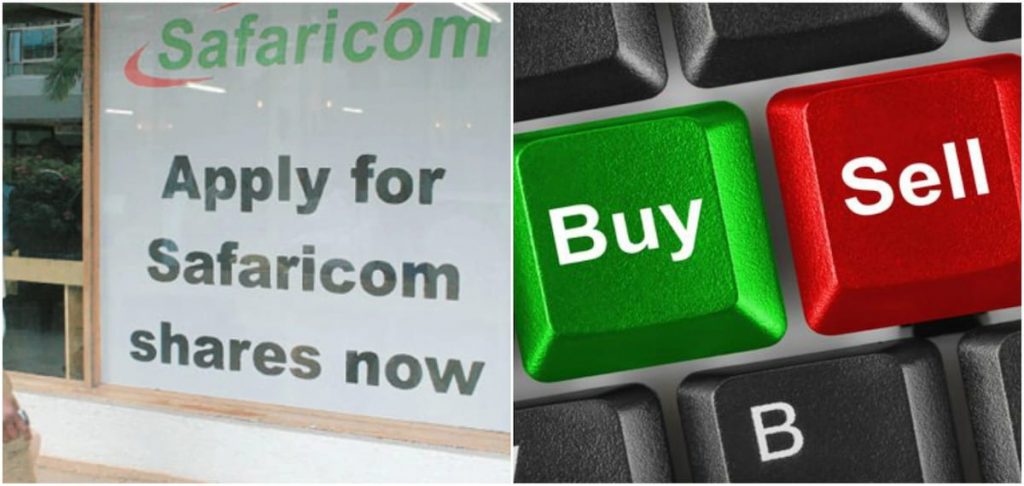In just slightly more than five (5) years, the increase in the price of Safaricom’s shares has led to the creation of an additional 1,500 millionaires.

What this means in a nutshell is that the telecommunications giant; Safaricom now has not less than 10,000 investors who each have shares that are worth more that 1 million Kenyan Shillings. According to regulatory filings and analysts, it is a significant increase from the estimated 8,500 millionaire investors it had in May of 2015.
The rise and rise of total number of high net worth investors in Safaricom has been a direct result of the growth in its share price.
The stocks of Safaricom (which is a listed company on the Nairobi Securities Exchange (NSE), has grown to a current all time high of 39 Kenyan Shillings. What this signifies is that any investor who has at least up to 25,700 shares in Safaricom, has experienced an increase in value of said shares to up to the 1 million Kenyan Shilling mark.

The affected investors exclude major establishments like Vodacom Group Limited, National Treasury, and Vodafone Group Plc and analysis is strictly based on the disclosures of the telecommunications giant’s distribution of ownership, as well as its share price which has enabled more and more investors to achieve millionaire status.
A number of stockbrokers estimate that about half of the total number of 21,000 investors who own over 10,000 shares in Safaricom, have at least 25,700 shares each.
This shows that at least 10,000 investors in Safaricom, own shares that are worth more than 1 million Kenyan Shillings.
At the end of May of 2015, Safaricom’s stocks traded at 15.85 Kenyan Shillings each. Back then, it meant one had to have more than 63,100 units in order to be able to hit the 1 million Kenyan Shillings point.
Although the majority of Safaricom’s millionaire investors are Kenyan, foreign investors including those from other East African countries like Tanzania and Uganda are also involved.
The increase in Safaricom’s number of high net worth or millionaire investors, mirrors its shares increase in value over the years and is expected to attract more investors to the East African nation of Kenya’s most profitable company.
Since it went public on the 9th of June 2008 with an initial public offering of 5 Kenyan Shillings per share, the share price for the telecommunications giant has grown by an impressive 680 percent.
Safaricom’s 18 billion Kenyan Shilling interim dividend which will be paid on the 31st of March 2021, will bring its total cash distributions since it became a publicly traded company to 375 billion Kenyan Shillings.
The telecommunications company’s entry into the stock market has led to it surpassing other blue chip companies in Kenya in terms of sheer number of high net worth shareholders.

For example BAT Kenya (British American Tobacco Kenya) which is a cigarette manufacturer in the country, currently has around 1,000 individual shareholders who each have shares that are worth more than 1 million Kenyan Shillings.
Safaricom also has the largest concentration of ultra rich investors on the Nairobi Securities Exchange (NSE). One of them is Moses Thara who has a total of 10.1 million shares in Safaricom with a current market value of 393 million Kenyan Shillings.
John Kibunga Kimani has a total of 16.2 million shares in Safaricom which at today’s current market value, are worth 631 million Kenyan Shillings.
A grand total of 9 Kenyan investors have 106 million shares which are valued at an impressive 4.1 billion Kenyan Shillings.
According to Businesses Daily Africa the majority of Kenyan individual investors did not reap the fruits of Safaricom’s wealth creation. The publication said the investors sold off their shares earlier on when the telecommunications company’s share price dropped below the initial 5 Kenyan Shilling Initial Public Offering (IPO) price and continued to do so in order to capitalize on their profits when its share price eventually began to rise.

The August 2020 regulatory filings revealed that the Kenyan investors as well as the investors from other East African countries have a total of 1.5 billion Safaricom shares which is equivalent to a 3.8 percent stake. This is 67.6 percent lower than the 4.8 billion Safaricom shares or 11.9 percent stake that they first acquired during the Initial Public Offering (IPO).
International asset managers like Fidelity, JPMorgan, and BlackRock have more than doubled their combined shares in Safaricom from 5 percent to 10.9 percent over the same period.
Institutional investors based in Kenya like the National Social Security Fund (NSSF) alongside numerous insurers, have been accumulating Safaricom shares over the years.
The net sellers of Safaricom shares so far, have been individual investors. This has gone on since the telecommunications giant first joined the stock market and its share price experienced a sharp drop to 2.5 Kenyan Shillings per share, which was below the Initial Public Offering (IPO) price of 5 Kenyan Shillings per share.
Over the period of time that it has taken Safaricom’s share price to increase in value, an estimate of over 250,000 retail investors have sold off their shares. Its share price really began its steady upward boost in December of 2012.
The retail investors who dropped away, have reportedly lost estimated gains of over 80 billion excluding of course, dividends.
To help local investors share in the profits of Safaricom, the Kenyan government as an intentional policy allocated a total of 4.8 billion shares which is almost half of the total of 10 billion shares that were sold at the company’s Initial Public Offering (IPO).
Safaricom was able to raise a total of 50 billion Kenyan Shillings from its Initial Public Offering (IPO) through the sale of 10 billion shares to foreign investors, individuals, as well as firms in Kenya. The 10 billion shares are equivalent to a total of 25 percent stake in the company.
The news led to retail investors applying for 4.7 times (22.6 billion shares) more than the total shares (4.8 billion shares) that were provided.
Even banks in Kenya offered loans to their customers to enable them purchase the shares. Investment establishments were also cheered on to participate in the Initial Public Offering (IPO).

Around 800,000 new accounts were created as a result of the Initial Public Offering (IPO). This more than doubled the amount of investors on the Nairobi Securities Exchange (NSE)) from 700,000 to 1.5 million.
During the Initial Public Offering (IPO) retail investors paid a total of 24 billion Kenyan Shillings for the shares purchased. If the investors had held on to the shares, said shares would have a market value of 187 billion Kenyan Shillings in today’s market.
Over the years, investors have sold a total of 3.2 billion Safaricom shares. They are reportedly left with a total of 1.5 billion shares which are currently valued at 58 billion Kenyan Shillings.
The shares held by individual investors are expected to continue to drop as foreign and local institutional investors continue to acquire assets which are then geared towards Safaricom shares as well as other shares.
The telecommunications giant’s shares are currently one of the most sought after shares in Kenya by institutional investors who in recent times, have been executing hundreds of millions of Kenyan Shillings worth of Safaricom shares every day.
Recent disclosures reveal that the National Social Security Fund (NSSF) in the year which ended in June 2018, invested almost quarter of its portfolio (equities wise) into Safaricom. This increased its total from 14.7 percent which was the case in 2017.
During the period under review the National Social Security Fund (NSSF) which is a pension fund had Safaricom shares that were worth 15.8 billion Kenyan Shillings, with its total stocks portfolio standing at an impressive 65.3 billion Kenyan Shillings.
How informative was this article? Are there any other new topics, categories, or How To topics, that you would like us to write on? Feel free to reach out to Mpesa Pay in the comment section.


